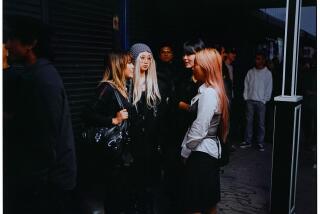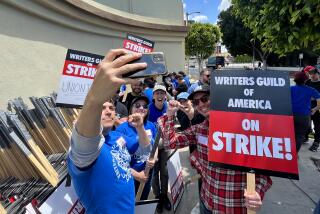Getting Out of Line : Queuing Served to Remind the British That They Were Indeed Civilized
- Share via
TINY SIGNS forebode the inexorable collapse of a society.
Writing recently in a British publication, Marcel Berlins deplored what he sees as the decline of the English queue--that custom by which the English voluntarily line up at bus stops and the like.
“When I first came to England from France 20 years ago,” he writes, “people queued as a matter of fairness and principle. It made a deep impression on me. The English queue was one of the few stereotypical national traits, almost jokes, that turned out to be true.”
I remember that on my first trip to England I was gratified by the patience and courtesy of the English in lining up, especially at bus stops, where they automatically formed a line to enter the bus, with no pushing and no cutting in. It was a discipline by which a historically aggressive people reminded themselves that they were civilized.
However, Berlins observes, “it’s true no longer. Today we queue because we are told to, and barriers and ropes have been put up to funnel us into line.” Sometimes, he notes, numbered chits are passed out, and a person is served when his number is called.
We are familiar with those systems here in the United States. At Disneyland, they serve large numbers of people at rides by a ribbon of switchback lanes through which they must pass.
Disneyland also solved the litter problem by employing young people with scoops and brooms to pick up the debris.
I have an idea that this constant cleanup has an indirect effect on crowds: People are more likely to litter where litter abounds.
Several years ago our banks adopted the Disneyland method of channeling lines at the tellers’ windows into one line defined by ropes; the person at the head of the line waits for a signal from an open window.
When this system was instituted, I wondered why it had taken them so long to think of it. Going to the bank used to be like betting on a horse race. You looked at the length of each line, tried to judge the speed of its teller, checked the customers to see whether they were carrying large company deposits, then made your bet. Usually, my line turned out to be the slowest, and sometimes I would switch to a line that seemed to be moving faster, only to see it slowed down by some unforeseeable hang-up.
“We have lost the honour of being the only nation that queued through choice and conviction,” Berlins says, “and have joined the rest of the world’s people in lining up either not at all or grudgingly. Those who have tried to keep the old-fashioned values have soon found themselves elbowed aside, unserved and unnoticed.”
We have all had the infuriating experience of being pushed aside by someone who shoved in line ahead of us. The other evening my wife went to the Terminal Annex post office to send a large bulk mailing, and a man stepped over a chain separating her line from an adjoining line, and pushed in front of her just as she reached the head of her line.
She complained to the clerk, “That man stepped over the chain and got in front of me.”
The clerk said, “You should have said something.”
My wife said, “I am saying something!”
The clerk said, “You have to say it right away.”
My wife said, by now in some heat, “I am saying it right away.”
The man and the clerk ignored her, and he was served first.
She told me the story when she got home. “I called him a name,” she said. She was still in a fury. I didn’t ask her what she called him. I thought I’d rather not know.
But we are a motorized people here. Los Angeles used to have the most courteous drivers of any urban area in the country.
Now, that roadway courtesy, like the British queue, has vanished. Once we’re behind the wheels of our cars, our good manners seem to desert us. We tailgate. We cut in. We run red lights. We shout and snarl and shake our fists. We have even been known to shoot one another.
I suspect it’s an early sign of our inevitable collapse.
More to Read
Sign up for The Wild
We’ll help you find the best places to hike, bike and run, as well as the perfect silent spots for meditation and yoga.
You may occasionally receive promotional content from the Los Angeles Times.






